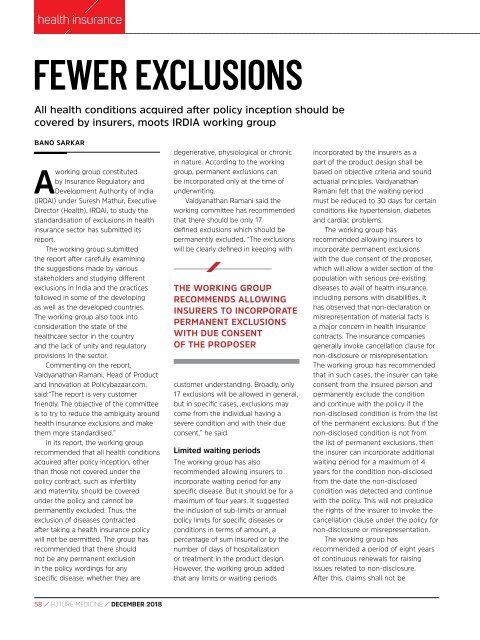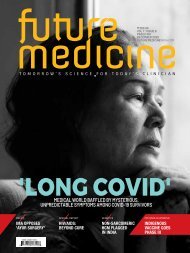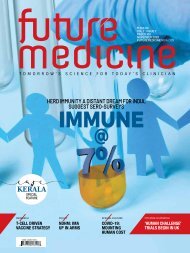FM DECEMBER 2018 ISSUE - digital edition
You also want an ePaper? Increase the reach of your titles
YUMPU automatically turns print PDFs into web optimized ePapers that Google loves.
health insurance<br />
FEWER EXCLUSIONS<br />
All health conditions acquired after policy inception should be<br />
covered by insurers, moots IRDIA working group<br />
BANO SARKAR<br />
A<br />
working group constituted<br />
by Insurance Regulatory and<br />
Development Authority of India<br />
(IRDAI) under Suresh Mathur, Executive<br />
Director (Health), IRDAI, to study the<br />
standardisation of exclusions in health<br />
insurance sector has submitted its<br />
report.<br />
The working group submitted<br />
the report after carefully examining<br />
the suggestions made by various<br />
stakeholders and studying different<br />
exclusions in India and the practices<br />
followed in some of the developing<br />
as well as the developed countries.<br />
The working group also took into<br />
consideration the state of the<br />
healthcare sector in the country<br />
and the lack of unity and regulatory<br />
provisions in the sector.<br />
Commenting on the report,<br />
Vaidyanathan Ramani, Head of Product<br />
and Innovation at Policybazaar.com,<br />
said:“The report is very customer<br />
friendly. The objective of the committee<br />
is to try to reduce the ambiguity around<br />
health insurance exclusions and make<br />
them more standardised.”<br />
In its report, the working group<br />
recommended that all health conditions<br />
acquired after policy inception, other<br />
than those not covered under the<br />
policy contract, such as infertility<br />
and maternity, should be covered<br />
under the policy and cannot be<br />
permanently excluded. Thus, the<br />
exclusion of diseases contracted<br />
after taking a health insurance policy<br />
will not be permitted. The group has<br />
recommended that there should<br />
not be any permanent exclusion<br />
in the policy wordings for any<br />
specific disease, whether they are<br />
degenerative, physiological or chronic<br />
in nature. According to the working<br />
group, permanent exclusions can<br />
be incorporated only at the time of<br />
underwriting.<br />
Vaidyanathan Ramani said the<br />
working committee has recommended<br />
that there should be only 17<br />
defined exclusions which should be<br />
permanently excluded. “The exclusions<br />
will be clearly defined in keeping with<br />
THE WORKING GROUP<br />
RECOMMENDS ALLOWING<br />
INSURERS TO INCORPORATE<br />
PERMANENT EXCLUSIONS<br />
WITH DUE CONSENT<br />
OF THE PROPOSER<br />
customer understanding. Broadly, only<br />
17 exclusions will be allowed in general,<br />
but in specific cases, ,exclusions may<br />
come from the individual having a<br />
severe condition and with their due<br />
consent,” he said.<br />
Limited waiting periods<br />
The working group has also<br />
recommended allowing insurers to<br />
incorporate waiting period for any<br />
specific disease. But it should be for a<br />
maximum of four years. It suggested<br />
the inclusion of sub-limits or annual<br />
policy limits for specific diseases or<br />
conditions in terms of amount, a<br />
percentage of sum insured or by the<br />
number of days of hospitalization<br />
or treatment in the product design.<br />
However, the working group added<br />
that any limits or waiting periods<br />
incorporated by the insurers as a<br />
part of the product design shall be<br />
based on objective criteria and sound<br />
actuarial principles. Vaidyanathan<br />
Ramani felt that the waiting period<br />
must be reduced to 30 days for certain<br />
conditions like hypertension, diabetes<br />
and cardiac problems.<br />
The working group has<br />
recommended allowing insurers to<br />
incorporate permanent exclusions<br />
with the due consent of the proposer,<br />
which will allow a wider section of the<br />
population with serious pre-existing<br />
diseases to avail of health insurance,<br />
including persons with disabilities. It<br />
has observed that non-declaration or<br />
misrepresentation of material facts is<br />
a major concern in health insurance<br />
contracts. The insurance companies<br />
generally invoke cancellation clause for<br />
non-disclosure or misrepresentation.<br />
The working group has recommended<br />
that in such cases, the insurer can take<br />
consent from the insured person and<br />
permanently exclude the condition<br />
and continue with the policy if the<br />
non-disclosed condition is from the list<br />
of the permanent exclusions. But if the<br />
non-disclosed condition is not from<br />
the list of permanent exclusions, then<br />
the insurer can incorporate additional<br />
waiting period for a maximum of 4<br />
years for the condition non-disclosed<br />
from the date the non-disclosed<br />
condition was detected and continue<br />
with the policy. This will not prejudice<br />
the rights of the insurer to invoke the<br />
cancellation clause under the policy for<br />
non-disclosure or misrepresentation.<br />
The working group has<br />
recommended a period of eight years<br />
of continuous renewals for raising<br />
issues related to non-disclosure.<br />
After this, claims shall not be<br />
58 / FUTURE MEDICINE / <strong>DECEMBER</strong> <strong>2018</strong>


















